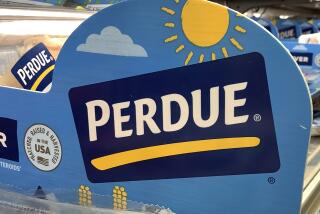Tough Guy Who Sells Tender Chickens Isn’t Ready to Roost
- Share via
SALISBURY, Md. — Arthur Perdue never retired and he had a few words of advice on the subject for his son.
“It’s like the throttle of an engine,” Arthur’s son, Frank Perdue, recalled. “As you get older you turn the throttle down a little bit.”
Frank Perdue, at 67, may be slowing down, but it’s hard to tell. Although he recently stepped aside as chief executive of Perdue Farms Inc., the nation’s fourth-largest poultry producer, he’s still known nationwide as the tough guy who sells tender chickens.
“It’s nothing like the end of an era,” said Perdue, who made himself and his poultry products famous through his television sales pitches. “I have lots of things to do.”
Perdue, who followed his father into the chicken business at age 10, remains chairman and chief promoter of his products. He plans to stay active in the business and keep peddling his wares on television, while Donald W. Mabe, president, takes over the reins as chief executive.
“I will be very visible and I’ll probably be on the road a lot,” Perdue said in an interview.
Mabe, who has answered only to Perdue for 28 of his 30 years with the company, is content with Perdue in the forefront of their marketing and advertising efforts.
“I don’t think I can replace Frank. It would be like someone trying to replace Colonel Sanders. Frank is so identifiable with our product, he would be hard to replace. . . . Frank Perdue is here to stay,” Mabe said.
And so is his poultry business. Today, Perdue Farms has seven poultry processing facilities and a turkey processing subsidiary, enabling it to process 6 million broilers and 1.5 million pounds of turkey per week.
The company has more than 14,000 employees and holds contracts with more than 2,000 independent chicken and turkey producers in Delaware, Maryland, Virginia, North Carolina and Indiana.
Started With $5
Perdue products are found along the East Coast from Maine to North Carolina and are breaking into the Midwest market in Cleveland. In fiscal year 1986-87, Perdue Farms had sales of $964 million.
“There are going to be ups and downs in this business because there always has been,” said Perdue, assessing his company’s prospects for growth. “There is an awful lot of production right now and when you get into a position of oversupply, you suffer lower earnings.
“But looking ahead 10 years, the odds are people will be eating less beef and less pork due to a diet-conscious public,” Perdue said.
If anyone is qualified to make such a judgment, it’s Perdue, who has worked his way up from the chicken coop to the board room. In 1920, Arthur Perdue bought 50 Leghorn chickens for $5 and entered the table egg business in Salisbury. Frank was put to work at a tender age and given responsibility for the care of a few dozen chickens.
After graduating from high school, the young Perdue attended a local college for two years then decided “the egg business wasn’t as bad as I thought.”
In 1939, Frank left college to rejoin the family business, which then consisted of three employees, Frank and his father included.
The operation grew, eventually shifting from selling table eggs to the hatching and growing of broilers. When Frank became president in 1950, Perdue Farms had 40 employees and was one of the largest chicken growers on Maryland’s eastern shore. The broilers were sold to major companies such as Swift and Armour, which marketed the Perdue chickens under their own brand names.
A Timely Move
In 1968, with 400 employees, Perdue Farms purchased its first processing plant in Salisbury and Perdue brand chickens hit the market.
The company’s recent expansion into turkeys was a natural extension of the processing business. And with turkey becoming a year-round food, the move was timely.
Perdue Farms entered the turkey business in 1984 with the acquisition of Shenandoah Valley Poultry Co. in Bridgewater, Va., and Shenandoah Farms in Washington, Ind.
The turkey market is growing slowly, but Mabe and Perdue predicted that it will continue to become more attractive to consumers. The company recently began producing ground turkey, which Perdue said is popular because “it looks a little like hamburger, but has tremendously less calories.”
Mabe called it a “low-cost alternative to ground beef.”
More to Read
Inside the business of entertainment
The Wide Shot brings you news, analysis and insights on everything from streaming wars to production — and what it all means for the future.
You may occasionally receive promotional content from the Los Angeles Times.










